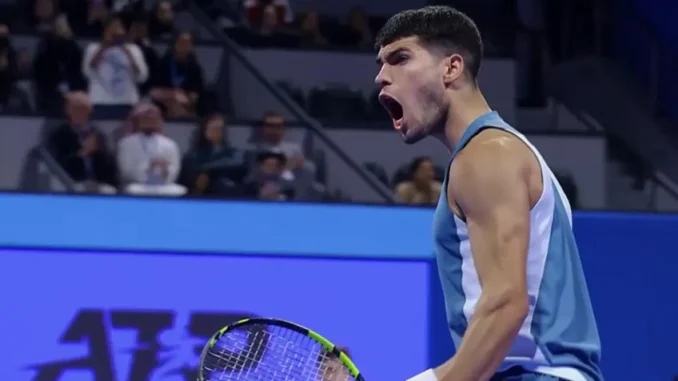
The tension was palpable, a thick blanket of anticipation draped over the packed stadium. Carlos Alcaraz, the young Spanish sensation, stood on the precipice of victory, leading Luca Van Assche 4-1 in their highly anticipated match. The crowd, a sea of faces buzzing with excitement, was ready to erupt, anticipating another display of Alcaraz’s electrifying talent. But then, something shifted. The momentum, seemingly firmly in Alcaraz’s grasp, began to slip away. Van Assche, displaying a resilience and skill that belied his ranking, mounted a stunning comeback, leaving Alcaraz searching for answers.
Alcaraz, known for his explosive power and remarkable court coverage, had started the match with his signature intensity. His groundstrokes crackled with pace, his serves boomed with authority, and his athleticism was on full display as he chased down every ball, seemingly covering every inch of the court. He quickly established a commanding lead, leaving Van Assche struggling to find a foothold in the match. The crowd was witnessing what they had come to see: the brilliance of Carlos Alcaraz.
But tennis, as it so often does, had other plans. Van Assche, to his credit, refused to wilt under the pressure. He absorbed Alcaraz’s early onslaught and began to find his rhythm. His serve, though not as powerful as Alcaraz’s, became more consistent, and his groundstrokes began to find their mark. He started to move Alcaraz around the court, forcing him into uncomfortable positions and capitalizing on any slight lapse in concentration.
“At 4-1, he started to play unbelievable,” Alcaraz explained after the match, acknowledging the sudden shift in momentum. “Honestly, I felt like I was playing against the world no. 1 at that moment.” Alcaraz’s words were a testament to Van Assche’s impressive performance. He wasn’t just winning points; he was dictating play, controlling the tempo of the match, and forcing Alcaraz onto the defensive.
The crowd, sensing the shift in momentum, fell into a hushed silence, their excitement replaced by a nervous tension. They watched as Van Assche chipped away at Alcaraz’s lead, point by point, game by game. The Spaniard, who had looked so dominant just moments before, suddenly appeared vulnerable, his shots losing their bite, his movement losing its fluidity.
“I didn’t know what to do at that moment,” Alcaraz admitted. “He was playing every point unbelievably. I tried to stay focused, to fight for every point, but it was difficult.” Alcaraz’s honesty revealed the mental challenge he faced. He wasn’t just battling an opponent; he was battling himself, trying to regain the form that had given him such a commanding lead.
Van Assche’s resurgence wasn’t just about his improved play; it was also about his mental fortitude. He had faced adversity early in the match, but he refused to be discouraged. He maintained his focus, stayed positive, and capitalized on every opportunity. He played with the confidence and belief of a top player, even though he was facing one.
“He raised his level so much,” Alcaraz continued, emphasizing the quality of Van Assche’s performance. “He was serving great, returning great, and he wasn’t making any mistakes. It was tough to play against him at that level.” Alcaraz’s words were a gracious acknowledgment of his opponent’s skill and resilience. He didn’t make excuses; he simply recognized that he had been outplayed.
As the match progressed, the tension continued to build. Van Assche’s confidence grew with every point he won, while Alcaraz struggled to regain his composure. The momentum had completely shifted, and the match, which had seemed so firmly in Alcaraz’s grasp, was now hanging in the balance.
“I learned a lot from this match,” Alcaraz reflected. “It shows me that I need to be prepared for anything. My opponent is always going to play their best, and I have to be ready to respond.” Alcaraz’s words revealed a maturity beyond his years. He wasn’t dwelling on the loss; he was using it as a learning experience, a chance to grow and improve.
The match served as a reminder that even the best players can have off days, and that even the most commanding leads can evaporate in the blink of an eye. It highlighted the importance of mental toughness, the ability to stay focused and composed even when facing adversity. And it showcased the unpredictable nature of tennis, a sport where anything can happen, and where upsets are always possible.
While Alcaraz was disappointed with the outcome, he recognized the value of the experience. He understood that setbacks are a part of the journey, and that they can be just as valuable as victories. He learned a valuable lesson about the need to maintain focus and intensity throughout the entire match, and he gained a newfound respect for the resilience and skill of his opponent. As he moves forward in his career, these lessons will undoubtedly serve him well. The match may not have gone his way, but it provided him with valuable insights that will help him grow as a player and as a person.
Leave a Reply